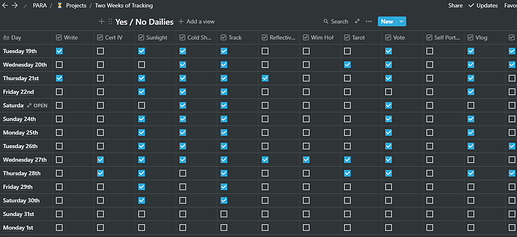What I’ll do
Track an overly ambitious amount of desired behaviours for two weeks to;
- force myself into accepting unchecked boxes and
- find best practices for consistent, agile and long term habit tracking
Background and Ideas
I’ve spent many years fucking around. I tried and failed countless ways to meet my potential. The sense of having a vast potential to live up to has been a crippling force in my life. One way it manifests is a heavy disappointment when I fail to maintain a new habit.
A forgiving and understanding attitude toward myself might improve my life in two ways;
- My happiness would be no longer tethered to my productivity
- I’d become more productive
Either way sounds like a win so I’ll give it a go. The key for me is not in changing my life overnight, but rather in settling into a consistent habit of tracking especially when things aren’t going my way.
Method
Using Notion I’ll track daily habits with two different tables. One will have check boxes as in yes or no, the other will be recurring such as time spent productively and number of push ups per day.
The list of yes no habits is purposefully exhaustive to ensure I practice acceptance and self compassion around those unchecked boxes. I suspect it will be a sink or swim kind of situation.
Testing period
Between Tuesday 19th of May and Monday 1st of June. I’ll most likely track throughout the day as tasks are completed.
Once this period is over I’ll re-calibrate and set off again. Currently I’m focused widely, on a lot of different habits and actions to see what the data shows, I suspect once I have that data I’ll feel a lot more confident in narrowing down my focus for future experiments.
Logs
I’ll probably hop in here every few days or so to add a short log of how things are going or anything substantial I’ve learned. This entry was written in my logbook a few days ago.
Random
I suspect that a two week turnaround will hit closer than my other attempts. I did a week before this and it was nice but the data from one work / rest cycle just doesn’t feel useful enough to try to draw a conclusion. Two might be the smallest usable block of time to measure?
I feel a rush at the beginning of these experiments, my last one showed a real downturn at the end (though for other personal reasons, I suspect). I’m interested to see if a pattern emerges.
Any tips or hints about not just running self tracking / behaviour change experiments, but also about logging and presenting those logs, would be greatly appreciated! 
